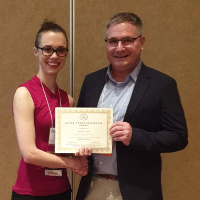
Sax Institute staff member Dr Danielle Currie has won an international award for her research into managing disease outbreaks of the waterborne parasite Cryptosporidium – research that will soon be adopted by a leading Australian university to improve its teaching on the topic.
Dr Danielle Currie, who works as a system dynamics modeller at the Sax Institute, was presented with the Lupina Young Researchers Award on 23rd July in New Mexico by the Systems Dynamic Society, a US-based not-for-profit that encourages the use of system dynamics to solve complex problems. The Award is given to outstanding papers that deal with health-related topics authored by students or recent graduates.

Dr Currie received the prestigious award for her PhD work with the University of Queensland, in which she examined Cryptosporidium – a hardy and infectious parasite that’s often transmitted through water contaminated with human or animal faeces. The parasite is the cause of Cryptosporidiosis, which is the third most commonly notified gastrointestinal infection in Australia.
Major outbreaks of Cryptosporidiosis occurred in Sydney in 1998 and Victoria in 2015, and with a recent spike in cases in the Brisbane and Gold Coast areas, Queensland Health was keen to use system dynamics to investigate how the parasite was transmitted through public swimming pools and find possible solutions for the problem.
Dr Currie says the dynamic modelling provided several interesting insights. “We found that we’re vastly underestimating the role that GPs can play in the solution to this problem. GPs play a key role in educating patients who may be infected and helping them reduce the likelihood of transmitting to others, especially though swimming pools.”
The results of Dr Currie’s research are now being developed into a teaching tool at the University of Queensland, helping health science students to better understand the environmental transmission of the disease.
Dr Currie says that winning the Lupina Young Researchers Award is a wonderful honour. “I’m always trying to teach people about how valuable system dynamics modelling can be in terms of acting as a decision-support tool, so being able to see it in action is really fulfilling. I really like that it has life beyond me and my PhD.”
Dr Currie’s Cryptosporidium work has also received an honourable mention for the Society’s Dana Meadows Award, which recognises high-quality work in the field of System Dynamics.
The Sax Institute’s Decision Analytics team harnesses the latest technologies and methods to develop adaptable decision support tools that forecast the impact of alternative decision options before they are implemented in the real world.
We work in partnership with government departments, policy agencies and program planners in health and social sectors, applying computer simulation and other technologies to provide decision makers with a low-risk way of understanding which combinations of interventions are likely to be the most effective over time. Find out more about the Sax Institute’s Decision Analytics here.
